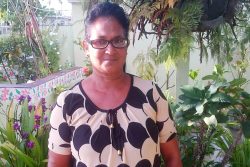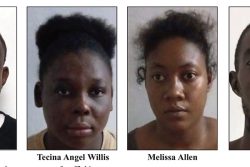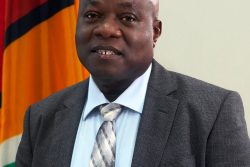Dear Editor,
When I received the news that Sister Tchaiko had died, I was on my way to the Walter Rodney Groundings (WRG), a WPA TV show on Sunday May 7th 2017. Brother Desmond Trotman had picked me up along the route to take me to the studio and, on entering the car he told me our Sister had died. He had gotten the information from an email Sister Andaiye sent out alerting persons to what had happened. I was stunned on hearing the news. For a moment my body went cold. I knew of Sister Tchaiko’s illness but was not aware that her situation was that critical.
Trotty and I joined Brother Deon Abrams on the WRG program where we expressed our personal and collective condolences to Brother Eusi and his children.
I first came into contact with Sister Tchaiko as a young activist in the African Society for Cultural Relations with Independent Africa (ASCRIA) in early 1970. She was one of the many militants from the diaspora who came to Guyana through the Pan African Secretariat. At that time the Pan African Secretariat was housed in ASCRIA’s building in Georgetown. In those days ASCRIA and the PNC were allies and worked closely. ASCRIA supported the Burnham regime and its social, economic and political objectives.
I recall working with Sister Tchaiko in a house-to-house campaign in sections of Georgetown explaining to residents the government’s nationalization policy and urging their support.
Tchaiko and Eusi worked together in many African villages across the country, promoting African culture, education, and politics. The Kwayanas became a household name in the homes of thousands across the country.
In the course of their work for ASCRIA Eusi and Tchaiko collaborated in the production of a book titled Scars of Bondage: A first study of the slave colonial experience of Africans in Guyana. They also collaborated on the first comprehensive book of African names in Guyana.
Given my closeness with Eusi and Tchaiko and the endless hours I spent at their home as a comrade and a student, I can give scores of examples of Tchaiko’s contributions to the struggles of the African community and the Guyanese nation. Her activities were varied, cultural, moral, social, spiritual, educational ‒ formal and informal ‒ economic and political.
When one grieves for a fallen comrade the challenges that one faces in trying to put one’s thoughts of that person on record are numerous. It is in this context that I have encountered some difficulty in coming to grips with the main focus of this tribute. There is so much one can say about the life and work of this Pan African heroine but I feel it is important to say the following.
As I reflect on the fact that Sister Tchaiko departed to the world of the ancestors in the month of May, the month of Guyana’s Independence Anniversary, it should be borne in mind that Sister Tchaiko’s sojourn here in Guyana began shortly after Guyana became an independent country. I recall that this historic event was marked by the renewal of Venezuela’s erroneous claim to three fifths of our territory and that country illegally invaded and occupied Guyana’s half of Ankoko Island. There seems to be great significance that our beloved Sister died while we are celebrating our 51st Independence Anniversary and this period like the earlier period, is once again characterized by our western neighbour’s aggression and its renewed claim to our territory.
The observation I wish to make now relates to ASCRIA and Tchaiko/Eusi’s work to protect our nation’s territorial integrity on our western border. Burnham and his government had agreed to an ASCRIA initiative to develop economic communities at strategic points in the area illegally claimed by Venezuela. The objectives of that initiative were as follows: (a) to have communities occupying the land economically; (b) shift some of the population from the coast to the hinterland; (c) locating communities in the area had the advantage of providing early information on Venezuela military movements. If my memory is correct three such communities were established, which we called Ujamaa Villages.
These were to be socialist type communities. The idea was adopted from Tanzania. Many comrades from the diaspora, notably from North America, took up residence in these areas. Sister Tchaiko played a major role in these developments. It will be remiss of me not to mention the names of other diaspora sisters and brothers who contributed immensely in our work at that time. I recall Sisters Ayesha, Roberta and Shukuru and Brothers, Gaiedi and Zulili.
But the Ujamaa communities/villages became victims of the ASCRIA/PNC split and they died. Theirs were not natural deaths, but speedy ones after Burnham declared war on ASCRIA. The diaspora comrades and particularly those from North America were no longer welcome in Guyana and the Pan African Secretariat was subsequently removed from Guyana.
I am contending here that the death of Sister Tchaiko in the month of May has some significance for those of us who have survived the struggles of that period. It is a reminder to us of the contradictions of that memorable period in Guyana’s history. In a way Tchaiko’s death is also reminding Guyanese of the challenges we still face as a community and as a nation. These are (1) to defend our territorial integrity; (2) shift the population from the coast to interior locations; (3) establish a socially just society; and (4) the need for the African community to rekindle the Pan African spirit and solidarity.
These observations and reflections I believe capture our beloved Sister’s importance, her devotion and solidarity to her adopted country and her Pan African Spirit.
Sister Tchaiko lives!
Yours faithfully,
Tacuma Ogunseye









